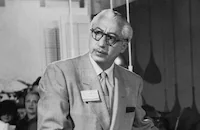Vaudeville and baseball come together in this early musical that served as the basis for the later Gene Kelly, Frank Sinatra hit Take Me Out to the Ball Game (1949). This time the vaudevillian baseball players are Gus Van and Joseph T. Schenck, a vaudeville team making their only feature together (Schenck died a few months after the picture's release). Both are in love with pretty blonde Bessie Love, who seems to favor Schenck, until a vamp breaks up the romance and the act. Van and Schenck's numbers actually come from their vaudeville act and contain some pretty shocking, by contemporary standards, ethnic humor. That's balanced by Love's sweet delivery of "A Man of My Own." But the real highlight of the film is a trip to a Harlem theatre for the film's one big production number, "Harlem Madness." The principal soloist is Nina Mae McKinney, the star of King Vidor's Hallelujah (1929) who was often dubbed "The Black Garbo," with an off-stage assist from Cliff "Ukulele Ike" Edwards and an almost irresistible child dancer. The sequence was originally shot in two-strip Technicolor, but that version appears to be lost, though the loss of color does little to diminish the number's effect.
By Frank Miller
They Learned About Women

Brief Synopsis
Professional baseball players win big with their vaudeville act until love gets in the way.
Cast & Crew
Read More
Jack Conway
Director
Joseph T. Schenck
Jack
Gus Van
Jerry
Bessie Love
Mary
Mary Doran
Daisy
J. C. Nugent
Stafford
Film Details
Genre
Comedy
Musical
Sports
Release Date
Jan
1930
Premiere Information
release: 31 Jan or 14 Feb 1930
Production Company
Metro-Goldwyn-Mayer Pictures
Country
United States
Technical Specs
Duration
1h 12m
Sound
Mono (Western Electric Sound System)
Color
Black and White
Theatrical Aspect Ratio
1.37 : 1
Film Length
11 reels

Synopsis
Jack and Jerry, two major league baseball stars, entertain vocal ambitions, and after the World Series, the boys become a success in vaudeville. They fall in love with Mary, a dancer, but a vamp enters to break up the team and the boys return to play in another World Series. Ultimately, Mary and Jack are reunited.

Cast
Joseph T. Schenck
Jack
Gus Van
Jerry

Bessie Love
Mary
Mary Doran
Daisy
J. C. Nugent
Stafford

Benny Rubin
Sam
Tom Dugan
Tim

Eddie Gribbon
Brennan
Francis X. Bushman Jr.
Haskins
Crew
Milton Ager
Composer
Arthur "bugs" Baer
Dial
Alfred Block
Titles
David Cox
Wardrobe
Cedric Gibbons
Art Director
Thomas Held
Film Editor
Sammy Lee
Dance Director
Sarah Y. Mason
Scen
James Mckay
Film Editor
Joseph T. Schenck
Composer
Douglas Shearer
Recording Engineer
Robert Shirley
Recording Engineer
Leonard Smith
Director of Photography
Gus Van
Composer
Jack Yellen
Composer
A. P. Younger
Story

Film Details
Genre
Comedy
Musical
Sports
Release Date
Jan
1930
Premiere Information
release: 31 Jan or 14 Feb 1930
Production Company
Metro-Goldwyn-Mayer Pictures
Country
United States
Technical Specs
Duration
1h 12m
Sound
Mono (Western Electric Sound System)
Color
Black and White
Theatrical Aspect Ratio
1.37 : 1
Film Length
11 reels

Articles
They Learned About Women -

They Learned About Women -
Vaudeville and baseball come together in this early musical that served as the basis for the later Gene Kelly, Frank Sinatra hit Take Me Out to the Ball Game (1949). This time the vaudevillian baseball players are Gus Van and Joseph T. Schenck, a vaudeville team making their only feature together (Schenck died a few months after the picture's release). Both are in love with pretty blonde Bessie Love, who seems to favor Schenck, until a vamp breaks up the romance and the act. Van and Schenck's numbers actually come from their vaudeville act and contain some pretty shocking, by contemporary standards, ethnic humor. That's balanced by Love's sweet delivery of "A Man of My Own." But the real highlight of the film is a trip to a Harlem theatre for the film's one big production number, "Harlem Madness." The principal soloist is Nina Mae McKinney, the star of King Vidor's Hallelujah (1929) who was often dubbed "The Black Garbo," with an off-stage assist from Cliff "Ukulele Ike" Edwards and an almost irresistible child dancer. The sequence was originally shot in two-strip Technicolor, but that version appears to be lost, though the loss of color does little to diminish the number's effect.
By Frank Miller















